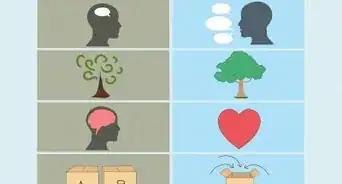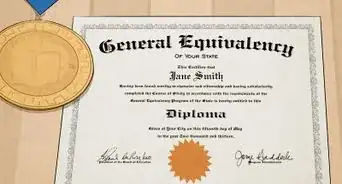This article was co-authored by Megan Morgan, PhD. Megan Morgan is a Graduate Program Academic Advisor in the School of Public & International Affairs at the University of Georgia. She earned her PhD in English from the University of Georgia in 2015.
There are 12 references cited in this article, which can be found at the bottom of the page.
wikiHow marks an article as reader-approved once it receives enough positive feedback. In this case, 94% of readers who voted found the article helpful, earning it our reader-approved status.
This article has been viewed 464,561 times.
Getting an education is important, as most career paths require at least some education and training. Though the decision to continue your education is a personal choice, it's worth considering if knowledge and experience are important to you. If you have any career goals, you will most likely need an education to achieve those goals. Learning the importance of an education can help motivate you to learn more and achieve great things.
Steps
Preparing for Your Future
-
1Decide on your career goals. If you've thought about your future at all, you probably have some idea of what you want to do as a career. No matter what your goal is, it will probably require some degree of education.[1]
- Search online for information about your desired career, or talk to professionals working in that field. There is a good chance that anyone you talk to will tell you that you'll need an education in order to enter that field. Note that the kind of education you will need may vary: some fields require formal college education, while others may lean more towards specialty training in the field.
- In the United States, only 27 percent of jobs available nationwide require less than a high school degree. By contrast, students who have graduated from high school are deemed qualified for 39 percent of jobs available nationwide.[2]
- Many people drop out of school thinking that they would rather work than be in school, but statistics show that the majority of high school dropouts are unemployed and have little or no source of income.[3]
-
2Get a better job. Even if the career you've chosen doesn't require an advanced education to break into the field, you will most likely need an education if you want to get promoted or earn a higher-paying job.[4]
- People who have completed an advanced education typically make more money than people who have not gone to school.[5] For example, in the United States, median weekly earnings in 2014 for people with only a high school diploma were $751 (men) and $558 (women).[6] In contrast, the median weekly earnings for people with least a bachelor's degree were $1385 (men) and $1049 (women) in 2014. For people with an advanced degree, the median weekly wage was even higher: $1630 (men) and $1185 (women).[7]
- Having a high school diploma dramatically increase the chances of earning a job over high school dropouts. That number continues to rise as students pursue higher education through college and graduate school.[8]
Advertisement -
3Find better opportunities. Getting an education opens a lot of professional doors for you. It can help you learn new skills, make professional connections, and generally have greater success.[9]
- People who have completed an advanced education often have more and better opportunities available to them because of their education.[10]
- Even if you have not completed a high school diploma, completing vocational training (education emphasizing a particular trade, such as electrician) will likely increase your income level and ability to find a job.[11] If you have a high school education and vocational training, you are a much more attractive candidate for jobs.
Overcoming Inequality
-
1Overcome income inequality. Studies have shown that having an education - even a primary education - can help low-income workers earn more money and find a better economic situation.[12]
- Employers look for educational achievements. Even having a high school degree will reduce the risk of unemployment and increase the average lifetime earnings of most working adults.[13]
- In the United States, 54 percent of high school dropouts between the ages of 16 and 24 are unemployed. For high school graduates, that number decreases to 32 percent of people in the same age bracket, and it decreases even further to 13 percent of college graduates.[14]
-
2Live a better life. Beyond the professional opportunities that an education affords people, having an education may also be correlated with living a better life in general. Some studies suggest that people who stay in school are less likely to end up having legal troubles later in life.[15]
- College graduates with a bachelor's degree earn an average of $1.64 million dollars more than high school dropouts over the course of a lifetime. High school graduates earn an average of $429,280 more than high school dropouts over the course of a lifetime.[16]
- Having an education (and subsequently getting a better job) may make people less likely to commit crimes for fear of losing what they've worked for.[17]
- The average high school dropout in America has a one in 10 chance of being arrested, whereas the average high school graduate only has a one in 35 chance of being arrested.[18]
- Some studies suggest having an education can also make people more patient, and therefore less likely to be overcome by anger or violent tendencies.[19]
-
3Help your family. Having an education is typically associated with an increased ability to provide for your family. That means not only being able to help financially support your family, but also providing younger relatives with a positive role model, and inspiring them to pursue an education.[20]
Recognizing the Social Benefits of an Education
-
1Live a longer life. Some studies suggest that having a higher education can help you live a longer life. This may be because of better working conditions that come with an education, or it could be because earning an education helped remove people from adverse domestic situations. Whatever the cause, many studies show that even earning a high school education significantly decreases the likelihood of dying young.
- Young men who graduate high school statistically live an average of seven years longer than male high school dropouts. Young women who graduate high school live an average of six years longer than female high school dropouts.
- Young men who graduate college statistically live an average of 13 years longer than male high school dropouts, and an average of six years longer than male high school graduates who do not go to college. Young women who graduate college live an average of 12 years longer than female high school dropouts, and an average of six years longer than female high school graduates who do not go to college.
-
2Be happier in life. In addition to living a longer life, people who pursue an education tend to be happier in life.[21] That's because having an education has been shown to make people better problem solvers who are better equipped to manage day-to-day problems.
- Some studies suggest that simply earning an education, regardless of subsequent income or job contentment, helps people have better mental health later in life.[22]
-
3Find more fulfillment in life. Some studies suggest that people who have completed an education are more likely to pursue things that offer personal fulfillment.[23]
- Flow, a term used to describe meaningful and satisfying absorption in a task, is often associated with educational advancement. In other words, having an education may help you find hobbies or passions that give you a sense of fulfillment.
- Many schools encourage flow, whether intentionally or not, by offering a stimulating learning environment and meaningful extracurricular activities to students who might not otherwise have those opportunities.[24]
Community Q&A
-
QuestionWhy is education the key to a brighter future?
 Community AnswerMany things you need in life can be taught through education which also betters your thinking capacity so you can solve problems more easily.
Community AnswerMany things you need in life can be taught through education which also betters your thinking capacity so you can solve problems more easily. -
QuestionAfter thanking our parents, is it our teachers that we should thank next?
 Community AnswerYes. Your teachers, along with your parents, will obviously be of importance in your educational path.
Community AnswerYes. Your teachers, along with your parents, will obviously be of importance in your educational path. -
QuestionCan I get a good job if I'm not educated?
 Community AnswerYes, but it's much more difficult to get a good job with a high salary if you lack an education.
Community AnswerYes, but it's much more difficult to get a good job with a high salary if you lack an education.
References
- ↑ http://www.deni.gov.uk/index/pupils-and-parents/pupils/why-do-i-need-to-attend-school.htm
- ↑ http://www.bls.gov/careeroutlook/2014/article/education-level-and-jobs.htm
- ↑ http://www.nytimes.com/2009/10/09/education/09dropout.html?_r=1
- ↑ http://www.dhs.state.il.us/Page.aspx?item=32311
- ↑ http://www.dhs.state.il.us/Page.aspx?item=32311
- ↑ http://www.bls.gov/opub/ted/2015/median-weekly-earnings-by-education-gender-race-and-ethnicity-in-2014.htm
- ↑ http://www.bls.gov/opub/ted/2015/median-weekly-earnings-by-education-gender-race-and-ethnicity-in-2014.htm
- ↑ http://www.bls.gov/careeroutlook/2014/article/education-level-and-jobs.htm
- ↑ http://www.dhs.state.il.us/Page.aspx?item=32311
- ↑ http://www.dhs.state.il.us/Page.aspx?item=32311
- ↑ http://www.sciencedirect.com/science/article/pii/0001879180900469
- ↑ http://www.theatlantic.com/business/archive/2015/04/what-education-can-and-cant-do-for-economic-inequality/389754/
- ↑ http://www.finaid.org/otheraid/CollegePowerBulletin.pdf
- ↑ http://www.nytimes.com/2009/10/09/education/09dropout.html?_r=1
- ↑ http://www.nytimes.com/2009/10/09/education/09dropout.html?_r=0
- ↑ http://www.finaid.org/otheraid/CollegePowerBulletin.pdf
- ↑ http://eml.berkeley.edu/~moretti/lm46.pdf
- ↑ http://www.nytimes.com/2009/10/09/education/09dropout.html?_r=1
- ↑ http://eml.berkeley.edu/~moretti/lm46.pdf
- ↑ http://www.finaid.org/otheraid/CollegePowerBulletin.pdf
- ↑ http://money.usnews.com/money/personal-finance/articles/2012/04/10/why-learning-leads-to-happiness
- ↑ http://money.usnews.com/money/personal-finance/articles/2012/04/10/why-learning-leads-to-happiness
- ↑ http://money.usnews.com/money/personal-finance/articles/2012/04/10/why-learning-leads-to-happiness
- ↑ http://www.edutopia.org/mihaly-csikszentmihalyi-motivating-people-learn
About This Article
Getting a good education is important for a variety of personal and financial reasons. Formal education will improve your job prospects by broadening your mind, teaching you new skills, and providing you with networking opportunities. Even if you don’t go to college, graduating high school will increase your chances of employment and as a result, increase your standard of life. Educated people also tend to be happier, live longer, and have a higher IQ. If you’re not drawn to any academic college courses, vocational training can be a great alternative, which should directly prepare you for a job. For more tips from our Educational co-author, including how to get an education if your family has a low income, read on!







































































